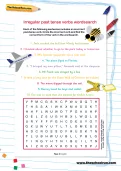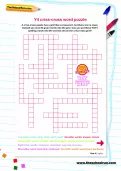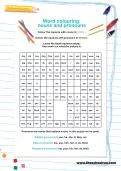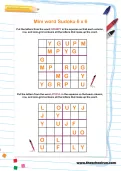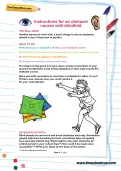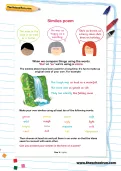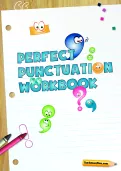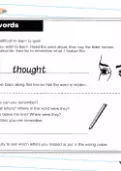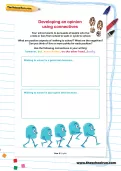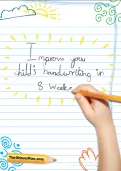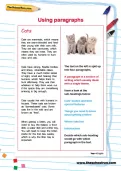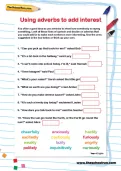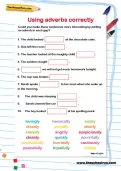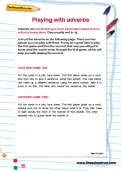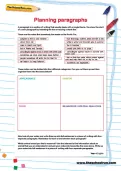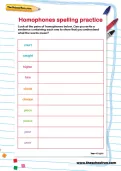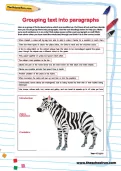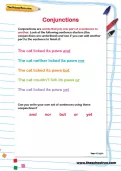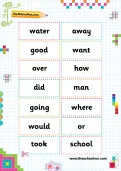Year 4 English worksheets
Free worksheets: Word puzzles, KS2, Y4
You’ll need to login or Register first to access these worksheets for free.
Once you’ve tried out our free worksheets, why not explore all our resources (1000s of worksheets, interactive tutorials, learning packs and more) with a 14-day FREE trial subscription.
Irregular past tense verbs wordsearch
A fun and free activity created by an experienced teacher with the aim of teaching KS2 children about irregular past tense verbs. Each of the sentences on the worksheet includes an incorrect past-tense verb. Circle the incorrect verb and then find the correct form of the verb in the wordsearch.
Y4 criss-cross word puzzle
A criss-cross puzzle has a grid like a crossword, but there are no clues. Instead you must fit given words into the grid. Can you put these Y3/Y4 spelling words into the correct slot on the criss-cross grid?
Word colouring: nouns and pronouns
Colour the squares with nouns in green. Colour the squares with pronouns in brown. Leave the blank squares empty, then work out what the picture is.
Mini word Sudoku 6 x 6
Put the letters from the word GRUMPY in the squares so that each column, row, and mini-grid contains all the letters that make up the word.
Instructions for obstacle course with blindfold
A worksheet guiding children on how to make an obstacle course to complete blindfolded while another child gives instructions. Provides an opportunity for speaking and listening attentively.
Similes poem
A worksheet prompting your child to write some similes which they can then work into a poem.
Perfect Punctuation Workbook
Full stops, commas, semi colons, apostrophes… Whatever aspect of punctuation your child is grappling with, we’ve come up with a bumper pack of 60 activities to help them practise, as well as a parent's refresher guide to each punctuation mark and how it's used.
Ways of learning tricky words
This worksheet gives suggestions on how to memorise the spelling of the word 'thought'. The strategies here could be applied to other tricky words.
Developing an opinion using connectives
This worksheet encourages children to think about the pros and cons of walking to school. It gives a list of connectives and suggests children use these in their writing.
Improve your child's handwriting in 8 weeks
Handwriting is a crucial life skill, but how can you help your child write neatly and legibly? Our eight-week learning pack is packed with information and tips from handwriting experts, as well as fun and practical steps you can take to help your child put theory into practice.
Using paragraphs
A set of paragraphs with muddled-up sub-headings. Encourage your child to read the paragraphs and then decide which sub-headings go where.
Using adverbs to add interest
A list of sentences containing speech. Children are encouraged to use the bank of adverbs to improve the sentences.
Using adverbs correctly
A list of sentences which could be improved by the use of adverbs. A bank of adverbs is included at the bottom of the sheet to help your child.
Reading comprehension: The night watch
A passage of text along with questions designed to prompt your child to retrieve information and infer ideas about characters' feelings. Answers are included.
Playing with adverbs
Cut up these adverbs and then play the two games suggested. This will help your child to understand the meanings of different adverbs and encourage them to use them when speaking and writing.
Planning paragraphs
Notes on the Arctic Fox for your child to cut up and then organise into different subject boxes. They then need to use these notes to write up their own paragraphs, understanding the need for keeping to a single theme for each.
Homophones spelling practice
Pairs of homophones and then blank boxes for your child to write their own sentences containing each homophone, demonstrating that they understand the meaning of each.
Grouping text into paragraphs
Various sentences about zebras for children to cut out and then sort into paragraphs. This activity should help your child to understand how each paragraph in a text needs to be about a single theme.
Conjunctions
A similar sentence repeated several times but with a different conjunction each time. Children need to think of ways to end the sentence.
KS2 high frequency words flashcards
After learning to read and spell the most common words in Reception and KS1, your child will move on to a longer list of common words including 'brought' and 'thought'. Support their learning at home with our KS2 high frequency words practice flashcards.
